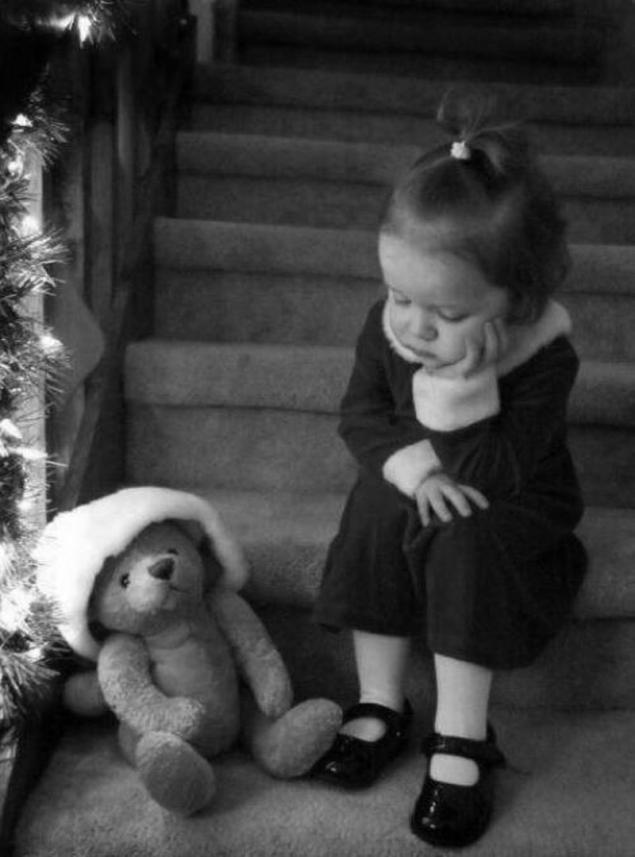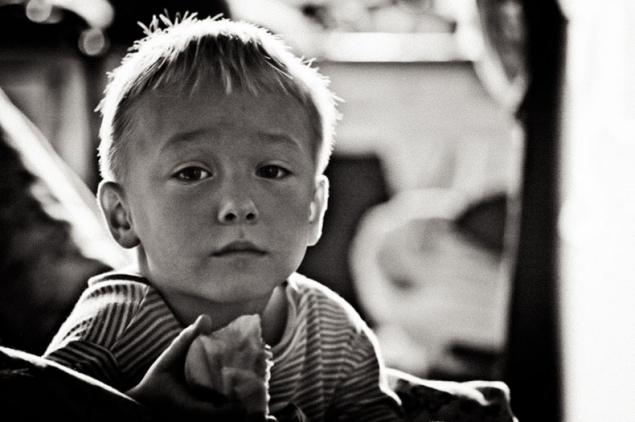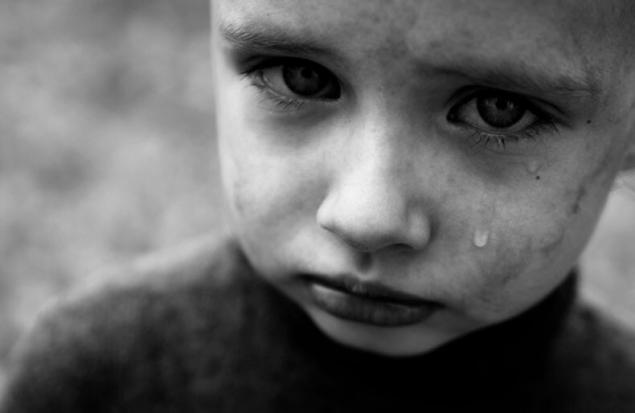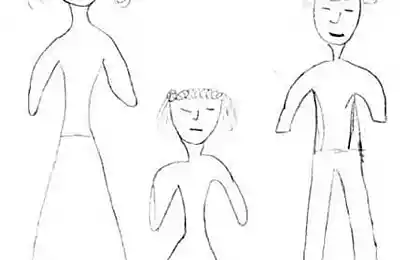513
All children of traumatized mothers dedicated...
All children of traumatized mothers dedicated... as well As those mothers who constantly feel their inner pain, that is, are traumatized.
Mom, it hurts so much with you that I prefer to forget themselves and the pain. And I created a new, so far hidden, first, but he still knocks to me. And I'm so scared. How terrible it was you next to me...

Traumatized people are unable to tolerate strong feelings. Because strong feelings — any — connect them with their trauma, and it can be very unsafe, down to the confluence of traumatic experiences and mental destruction. So they either have to avoid such feelings — both his own and others, or their own dosing, for example, the penchant for unrequited love one of these "dosages" when the pain is controlled a little is in sight, but not off the charts.
But if the traumatized woman has a child, then avoid feelings becomes more difficult.
The child is not initially able to hide their emotions and experiencing their bodily and quite clearly. There are mothers who are not able to transfer their child unhappy, angry, demanding, and irritated or suffering. If the child did not get what he needed, first he'll grieve, to cry and to be sad. Then "postponed" the need (for the principle of "green grapes") and will live on.
Generally a bunch of frustration — trying to get all the same — and if it is impossible to refuse, perevarivat and move on, it is very important for mental health. Grief work is the work that helps to survive any loss and move on. To survive the loss, not replace the lost item with something else. The child because of immaturity to experience the absence of something very important may not, it just puts off the need for "better times".
Sometimes an adult is faced with the fact that he has no right to something that literally "cannot be" and then, even if (and especially if it) ever possible, postpones, not the opportunity. For example, if a child does not receive love (love, not functional concerns) of the mother, it will require-require, and then begin to grieve.
Of course, in childhood to survive such grief is impossible and the child will postpone the work of grief later, these children look lifeless, and they are usually diagnosed as depression, children's depression (or Analiticheskaya depression) are depression loss.
But when all this work is to overcome what mother is not what I wanted, and move on? Not looking for a replacement mom, try not to get unconditional love and acceptance from other people, and if you fail this, then try not to get approval or become fit. To stay with the belief that, in principle, love is possible, it's just a mother could. But I'm actually worthy of love and to love me.
This is possible when the mother can not give something to the child, but may meet his strong feelings about it and support it in their experience. For example, the child is very painful and the mother can't change the situation (well, some trauma has already occurred and reversing the situation will not turn). What it can do for a child is to remain resistant to its pain and to let him know that it will pass, it is important not to give the child the feeling that he's unhappy, the victim and suffers.

Because if baby you can't teach it, it will be easy to experience pain and not be unhappy sufferer. That is, here the main thing — not to make the child a victim and stay with him in emotional contact. This mother needs to be resistant to pain, that is not having any internal naisseline own. That is, either not to be subjected to injury, either have a healed injury. In this case, it will be able to give him that connection when the child can feel that what happened is not fatal, it is possible to worry, that mom loves him and that she's with him.
If the mother has a trauma, it has its own permanent internal pain. And its resources, perhaps enough for you to just make. If there appears someone who suffers, its resources are hardly enough to make two suffering at the same time — a child (or another loved one). Then she will either reject the baby (interrupt the contact with him) with the care from your feelings (will interrupt the connection with their inner pain) or destroyed — will go in his suffering, will be in their injury and then emotional contact with the child still interrupted.
It will be a functional but not emotional, and the child is internally feels like what mom doesn't love him anymore. Although in reality the mother is trying to keep himself from leaving in the opened injury. And relive the feelings she can't, as we remember, and the suffering of the child for her — a sharp knife. It will try to replace the missing emotions on something else more affordable, such as hypertable, custody and other material pleasures.
Children usually feel as if my mother won't give anything important, but still gives something. And because ocase of these children are not separated from their mothers, in the hope that sooner or later they will, and missing, because mom is so responsive, doing so much for me and so much care.
Well, dependent on the context of its injury, perhaps will be angry and punish the child for his suffering. To discount his feelings — you're all there, what more do you need. Stop to require. And, in fact, prohibit to experience pain and sorrow. In the first — hipersaiti, and in the second case — rejection and punishment, the child is actually forbidden to feel what he feels.
Gradually the child begins to believe that what he feels is wrong, inadequate and most importantly — harm the mother. Because if you still survive, then support will not, and the mother cannot be saved, it does not bear the experiences of the child. And in this case the child is alone not only in the face of pain and despair, but also guilt for what he did to mom and now she's ruined and she became a victim.
Few adults Mature people cope with the task to support another person in that moment, when he himself is going through hard times. The child can not cope with this a priori. For your mum to lose a child — she can survive, he sacrifices his own feelings and somehow learns not to feel. Usually by ignoring, devaluation, displacement, suppression and other mental defenses.

Psychic protection, actually formed as a response of the psyche to the request — how not to feel what I feel obezbolit. To them, the child also learns from their parents. Often in the case of suppression there is a depression (the same Analiticheskaya), in the case of displacement — paranoid fears and phobias, in the case of depreciation, the narcissistic emptiness.
But more often, of course, these mechanisms are closely intertwined and in pure form are extremely rare. And then, growing up, a child will find herself. It will be vaguely or clearly feel that something is wrong, something is missing. He will look for yourself — alive, real, able to feel and experience life. And possible to find.
See also:
Pediatrician Gregory Saynow: How to recognize the child's medical emergency
10 powerful words for parents
But to do this he must resolve himself to endure the despair, grief, unrequited love. He will again have to endure the pain that he once banned himself. But then that ban was not to lose, and this permission — to gain.published
P. S. And remember, only by changing their consumption — together we change the world! ©
Source: uta-kryakva.livejournal.com/
Mom, it hurts so much with you that I prefer to forget themselves and the pain. And I created a new, so far hidden, first, but he still knocks to me. And I'm so scared. How terrible it was you next to me...

Traumatized people are unable to tolerate strong feelings. Because strong feelings — any — connect them with their trauma, and it can be very unsafe, down to the confluence of traumatic experiences and mental destruction. So they either have to avoid such feelings — both his own and others, or their own dosing, for example, the penchant for unrequited love one of these "dosages" when the pain is controlled a little is in sight, but not off the charts.
But if the traumatized woman has a child, then avoid feelings becomes more difficult.
The child is not initially able to hide their emotions and experiencing their bodily and quite clearly. There are mothers who are not able to transfer their child unhappy, angry, demanding, and irritated or suffering. If the child did not get what he needed, first he'll grieve, to cry and to be sad. Then "postponed" the need (for the principle of "green grapes") and will live on.
Generally a bunch of frustration — trying to get all the same — and if it is impossible to refuse, perevarivat and move on, it is very important for mental health. Grief work is the work that helps to survive any loss and move on. To survive the loss, not replace the lost item with something else. The child because of immaturity to experience the absence of something very important may not, it just puts off the need for "better times".
Sometimes an adult is faced with the fact that he has no right to something that literally "cannot be" and then, even if (and especially if it) ever possible, postpones, not the opportunity. For example, if a child does not receive love (love, not functional concerns) of the mother, it will require-require, and then begin to grieve.
Of course, in childhood to survive such grief is impossible and the child will postpone the work of grief later, these children look lifeless, and they are usually diagnosed as depression, children's depression (or Analiticheskaya depression) are depression loss.
But when all this work is to overcome what mother is not what I wanted, and move on? Not looking for a replacement mom, try not to get unconditional love and acceptance from other people, and if you fail this, then try not to get approval or become fit. To stay with the belief that, in principle, love is possible, it's just a mother could. But I'm actually worthy of love and to love me.
This is possible when the mother can not give something to the child, but may meet his strong feelings about it and support it in their experience. For example, the child is very painful and the mother can't change the situation (well, some trauma has already occurred and reversing the situation will not turn). What it can do for a child is to remain resistant to its pain and to let him know that it will pass, it is important not to give the child the feeling that he's unhappy, the victim and suffers.

Because if baby you can't teach it, it will be easy to experience pain and not be unhappy sufferer. That is, here the main thing — not to make the child a victim and stay with him in emotional contact. This mother needs to be resistant to pain, that is not having any internal naisseline own. That is, either not to be subjected to injury, either have a healed injury. In this case, it will be able to give him that connection when the child can feel that what happened is not fatal, it is possible to worry, that mom loves him and that she's with him.
If the mother has a trauma, it has its own permanent internal pain. And its resources, perhaps enough for you to just make. If there appears someone who suffers, its resources are hardly enough to make two suffering at the same time — a child (or another loved one). Then she will either reject the baby (interrupt the contact with him) with the care from your feelings (will interrupt the connection with their inner pain) or destroyed — will go in his suffering, will be in their injury and then emotional contact with the child still interrupted.
It will be a functional but not emotional, and the child is internally feels like what mom doesn't love him anymore. Although in reality the mother is trying to keep himself from leaving in the opened injury. And relive the feelings she can't, as we remember, and the suffering of the child for her — a sharp knife. It will try to replace the missing emotions on something else more affordable, such as hypertable, custody and other material pleasures.
Children usually feel as if my mother won't give anything important, but still gives something. And because ocase of these children are not separated from their mothers, in the hope that sooner or later they will, and missing, because mom is so responsive, doing so much for me and so much care.
Well, dependent on the context of its injury, perhaps will be angry and punish the child for his suffering. To discount his feelings — you're all there, what more do you need. Stop to require. And, in fact, prohibit to experience pain and sorrow. In the first — hipersaiti, and in the second case — rejection and punishment, the child is actually forbidden to feel what he feels.
Gradually the child begins to believe that what he feels is wrong, inadequate and most importantly — harm the mother. Because if you still survive, then support will not, and the mother cannot be saved, it does not bear the experiences of the child. And in this case the child is alone not only in the face of pain and despair, but also guilt for what he did to mom and now she's ruined and she became a victim.
Few adults Mature people cope with the task to support another person in that moment, when he himself is going through hard times. The child can not cope with this a priori. For your mum to lose a child — she can survive, he sacrifices his own feelings and somehow learns not to feel. Usually by ignoring, devaluation, displacement, suppression and other mental defenses.

Psychic protection, actually formed as a response of the psyche to the request — how not to feel what I feel obezbolit. To them, the child also learns from their parents. Often in the case of suppression there is a depression (the same Analiticheskaya), in the case of displacement — paranoid fears and phobias, in the case of depreciation, the narcissistic emptiness.
But more often, of course, these mechanisms are closely intertwined and in pure form are extremely rare. And then, growing up, a child will find herself. It will be vaguely or clearly feel that something is wrong, something is missing. He will look for yourself — alive, real, able to feel and experience life. And possible to find.
See also:
Pediatrician Gregory Saynow: How to recognize the child's medical emergency
10 powerful words for parents
But to do this he must resolve himself to endure the despair, grief, unrequited love. He will again have to endure the pain that he once banned himself. But then that ban was not to lose, and this permission — to gain.published
P. S. And remember, only by changing their consumption — together we change the world! ©
Source: uta-kryakva.livejournal.com/
Annuals for Your garden, blooming all summer
Business idea: Production of screws is a profitable business with an income of 4 000 000 rubles a year























